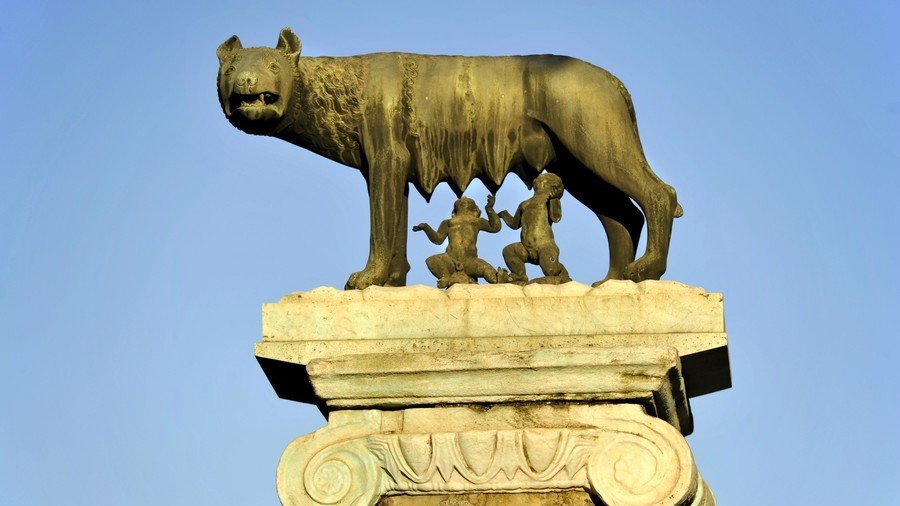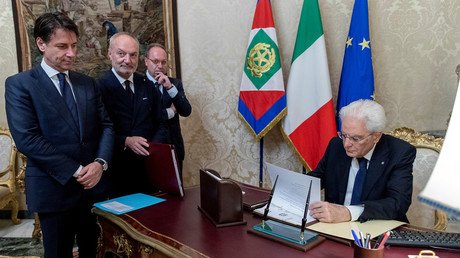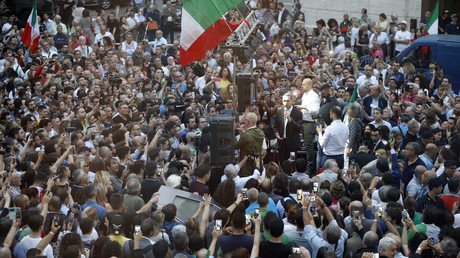Battered Italy, bruised Europe: Italian saga reveals deeper problems facing EU

Rome was neither built in a day and nor did it decline instantly. Italy has been crumbling over the last two decades under the weight of structural malfunction.
The fall reached precipitous levels in recent days with institutional gridlock and economic panic threatening another Europe-wide meltdown.
Since March, Italy lacked a government amid extreme uncertainty and confrontation between firebrand right-wing populists and their liberal opponents. Constitutional principles like the ‘will of the majority’ and ‘checks and balances’ wrestled with each other in a nerve-wracking contest of wills.
Notwithstanding a last-minute deal to finally stitch together a government, the saga has revealed deeper underlying maladies. Italy is on the frontline of a fissure gnawing at the heart of the contemporary Western world— nationalistic reassertion vis-à-vis supranational globalization.
The electoral success of two anti-establishment populist parties, the Five Star Movement and The League which will together govern Italy in a coalition, is premised on the same idea that hoisted Donald Trump to the White House and pushed the United Kingdom to Brexit, i.e. ‘us’ simple folks of the nation versus ‘them’ scheming distant elites.
In Italy, down-and-out citizens who are unemployed and frustrated blame the European Union and global financial forces for their misfortunes and believe that big powers like Germany and the international investors are caging and exploiting ordinary Italians.
Lay Italians rant about how taxes and prices keep rising, wages never keep up, and all the funds from the EU for local development are swallowed by Italian politicians and mafia bosses. One small business owner in Salerno told this author: “We have no state. It collapsed long ago and was taken over by the ‘Eurocrats’ based in Brussels and their Italian lackeys who have been ruling us.”
The perception of loss of people’s control over their own destiny is compounded by condescending attitudes of the EU’s top brass towards ill-performing and mismanaged economies like those of Italy, Greece and Spain. Comments from the EU’s budget chief, Gunther Oettinger, that the global markets will ‘teach’ Italian voters a lesson to abandon extreme options, have stirred outrage and nationalistic passion among Italians who say they are tired of being treated as a “colony of the Germans”.
Like Greece, Italy has not emerged from the global economic crisis that began in 2008. Worst-hit citizens are asking why the EU and foreign credit rating agencies should be imposing their will on fiscal spending limits and even on who should be Finance Minister in the next Italian government.
For commoners, the only ‘markets’ which matter are the physical ones dotting Italy’s streets and lanes where customers are scarce and profits are thinning. Privileging of interests of international bond and stock markets over real markets that determine livelihoods of simple people is a core problem that populists highlight and promise to overturn when they take power.
The idea of European integration was once championed by Italian Communists like Altiero Spinelli as an escape from narrow nationalistic rivalries and wars. Today, as the working classes in Italy suffer under fiscal austerity and breakdown of governance, the EU and bond investors are being painted as instruments of foreign big businesses to crush the nation’s poor.
If being yoked to global markets is riling the grassroots, the other factor driving the populist ascent is immigration. Throughout Italy, there is a noticeable presence of migrants from Africa and Asia who entered as part of a wave via the Mediterranean Sea in recent years. Populists blame them for crime and terrorism, channeling racial desires about restoring ‘national purity’, and vowing to deport the foreigners who are seen as “invading” Christian terrain.
Although the EU’s flag flies alongside the Italian one in public squares and government buildings, native Italians fume at the ‘burden’ saddled on them through reckless immigration without sufficient financial support or sharing by other EU member countries. Conspiracies that Germany colluded with the corrupt traditional Italian elite class and thrust unwanted migrants on Italy abound.
Defenders of European integration cite statistics and objective facts to assert that Italy has benefited economically from staying within the Euro and the EU. Even the new governing coalition of Five Star and The League has lately disavowed any intent to abandon the Euro currency or pursue an ‘Italexit’.
But it is obvious that populists have retracted from their characteristically strident anti-EU positions for tactical reasons in order to form a government after being blocked by the pro-EU Italian state establishment led by President Sergio Mattarella.
With Euroskeptics having now battled their way to power in Rome, we can expect Italy to worsen the already weakened consensus within the EU over common fiscal, cultural and foreign policies. Together with Hungary and Poland, populist-ruled Italy will form an internal opposition bloc inside the EU to undermine Germany and France’s liberal internationalist agenda.
When populists throughout Europe envision a ‘Europe of nations’ rather than a European Union, it sounds like a catharsis to their constituents on the ground who feel abandoned and left out of basic decision-making functions owing to alleged machinations of foreigners sitting far away in Brussels and financial capitalist hubs abroad.
As long as economic stagnation and cultural anxiety continue, the ire against supranational entities will not abate and the hyperbolic ambitions of liberal leaders like the French President Emmanuel Macron to craft a more united and powerful Europe will remain unfulfilled.
Brussels is often scapegoated for failures brought upon at least partly by Italians, Greeks or Spaniards on themselves. Prevalence of a regional culture in southern Europe based on personal favors and cutting corners suit patronage-centric political systems rather than rule-of-law. The EU or Wall Street bankers did not invent these troublesome features which predate modern times.
Yet, the signals from below are clear— people in the West have had enough of hyper-globalization and dismemberment of what used to be a defined community and national identity. They are seeking a democratic change where sovereignty, administration and policies affecting their pocketbooks are not fixed by speculative capitalist bond yield ‘spreads’, which the Italian President cited to rein in populists, but rather by the people’s autonomous choices in each country.
Understanding the anger in the boondocks and accommodating demands for at least some extent of ‘de-globalization’ are necessary to bridge the social ruptures opened up by excess financial market-based hegemony. The cookie cutter approach to globalization and continental homogeneity in Europe has to adjust to national context and popular backlash.
History shows that the EU has weathered numerous crises before and the populist wave of rage may also pass after it starts governing in countries like Italy and commits its own blunders. But the quest for a humane alternative to the existing alienating order is essential for political stability and mass contentment. This search transcends the immediate questions of who forms a government and how shares and equities will react to ministerial picks. It is the only path for the West to save itself from implosion.
Think your friends would be interested? Share this story!
The statements, views and opinions expressed in this column are solely those of the author and do not necessarily represent those of RT.


















